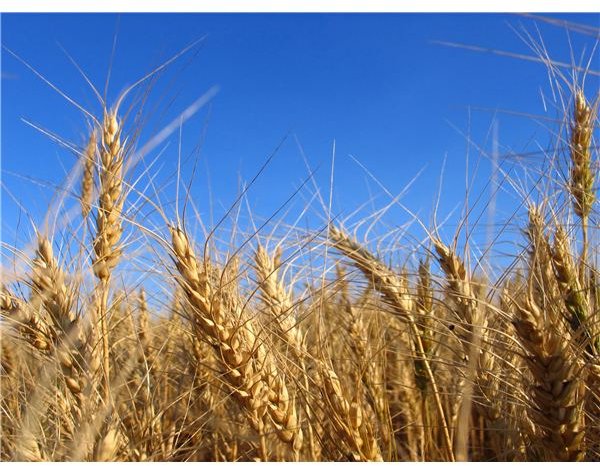A Look at Foods That Improve Your Mood
The Right Kinds of Carbohydrates…At The Right Time
Popular diet book authors seem to have split into two different camps—carbs are good, or carbs are bad— without paying much attention to how they make you feel. But according to scientific study, complex carbohydrates, like whole-grain bread, brown rice and yams, may improve your mood in two important ways. First, these types of carbohydrates are burned more slowly during metabolism than simple carbs like sugar, white bread and most processed baked goods. This keeps your blood sugar level more even throughout the day, which keeps you more even tempered. Aim to eat at least a small snack containing some protein (for example, a bit of almond butter on an apple, or whole-grain crackers with hummus) every three hours or so to keep blood levels more stable.
Second, carbohydrates in general may give you a good-feeling boost. Although there is a bit of controversy here, many scientists agree that this is because of the relationship of carbohydrates to two neurotransmitters in your brain: tryptophan and serotonin. Among many other bodily processes, serotonin can produce an elevation in mood. But first you’ll need tryptophan, a precursor to making serotonin available for your body. Some sources of tryptophan include chicken and turkey, nuts and seeds, bananas, soy and dairy products and red meat. In order to make the most of your tryptophan, eat a carbohydrate with it. For example, brown rice and tofu, or a sandwich made with whole-grain bread and turkey. This is why some denigrate Atkins style diets: people cut carbs to the bone, resulting in lower serotonin levels, and one cranky mood. Food scientists exploring the effects of food on mental health generally recommend a balanced diet that includes proteins, carbohydrates, small amounts of fat and proper hydration.
Eat More Fish
You may have heard about the importance of omega-3 fatty acids in the diet–and about the popularity of fish oil capsules. At least one study has associated mood disorders, such as depression, impulsive behaviors and bipolar disorder, with low levels of omega-3 in the bloodstream. Although, it’s not enough to simply take fish oil capsules and grill up some salmon. Omega-3 fatty acids, found in cold water, oily fish like salmon, herring and anchovies, and in flaxseed and walnuts, work in conjunction with omega-6 fatty acids found in eggs, meat, most cooking oils and many processed foods. An overabundance of omega-6 polyunsaturated fatty acids can overshadow the positive (and mood-boosting) effects of omega-3 fatty acids.
What About “Comfort Foods”?
An interesting phenomenon is the way “comfort foods” can improve your mood. We all have our favorites, maybe from childhood, like macaroni and cheese, pizza, cookies or ice cream. But according to some food scientists, this association could be merely that of a memory of more idyllic times, or an urge to “self-medicate” away difficult emotional states, and not about eating the actual substance. Many of the foods we associate with comfort contain high levels of fat, sugar, protein or salt, or any combination of the four. If you follow the theory that carbohydrates release serotonin in the cerebrospinal fluid, therefore inducing a pleasant mood, only the carbs from your favorite comfort foods has any possibility of uptake for conversion to serotonin. The fat and protein don’t do much to contribute to the state of your mood, although they could contribute to the state of your waistline.
Got Chocolate?
Chocolate, as many women will attest to, is the “go to” food for mood elevation. Is this really true? Well… yes and no. The caffeine and theobromine it contains makes you feel more alert, temporarily. And chocolate has several other compounds that could potentially light up your brain in the same way marijuana does, but not in a high enough concentration to measurably affect your mood. One study found that, given several types of chocolate (white chocolate, cocoa powder, milk chocolate or white chocolate with cocoa), only the milk chocolate satisfied participants when they had a chocolate craving. This says more about the actual “mouth feel” or experience of eating chocolate than any of its compounds for mood enhancement.
And Coffee?
You may have noticed how that cup of coffee in the afternoon gives you a good-feeling buzz. But caffeine is a psychoactive drug that can be addictive, and produce withdrawal symptoms in a regular user who doesn’t get his or her morning joe.
Trace Minerals
Iron deficiency may cause a low mood, so make sure you are getting adequate amounts in your diet from green, leafy vegetables, parsley, dried fruits, seafood, nuts, liver and beef.
Low levels of certain B vitamins, including thiamine and folic acid, can contribute to a poor mood or even depression. Although deficiencies in this vitamin are rare, be sure you’re getting enough whole grains, green, leafy vegetables and beans.
While some studies disagree on specific foods that improve your mood, there is a general consensus that a balanced diet can be your first step toward feeling better. But it can be worth trying some of the foods mentioned above to see if they work for you.
Credits
Top photo courtesy of Morguefile.com; bottom photo courtesy of istockphoto.com.
References
PubMed.gov, “The Role of Omega-3 Fatty Acids in Mood Disorders” https://www.ncbi.nlm.nih.gov/pubmed/18183532
PubMed.gov, “Vegetarian Diets Are Associated with Healthy Mood States” https://www.ncbi.nlm.nih.gov/pubmed/20515497
The Dartmouth Undergraduate School of Science, “You Are What You Eat: How Food Affects Your Mood" https://dujs.dartmouth.edu/fall-2010/you-are-what-you-eat-how-food-affects-your-mood
WebMD.com, “Food to Balance Your Mood" https://www.webmd.com/food-recipes/features/food-to-balance-your-mood
MIT News, “Carbs Are Essential for Effective Dieting and Good Mood, Wurtman Says” https://web.mit.edu/newsoffice/2004/carbs.html
The World’s Healthiest Foods, “Tryptophan” https://www.whfoods.com/genpage.php?tname=nutrient&dbid=103
